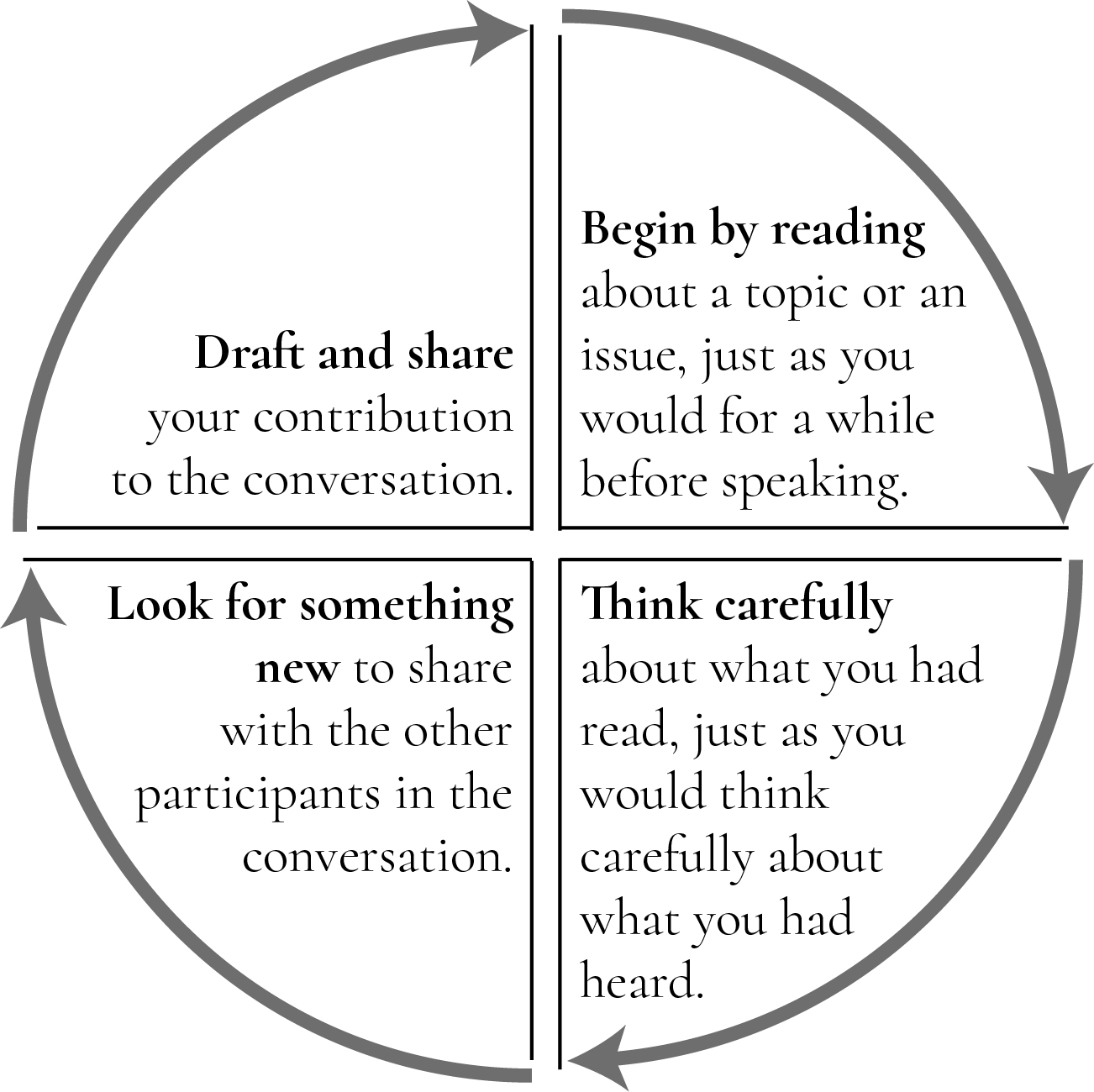Marine Corps University Communications Style Guide
CHAPTER ONE: INTRODUCTION TO THE COMMUNICATION PROCESS
Communication is one of the most important components of leadership. As a leader, the responsibility to mentor and inspire the people who work with you directly correlates with the need to effectively communicate your vision and goals. Developing strong written and oral communication skills will help you to convey your innovative ideas in a logical, coherent manner in order to put them into action or influence your leaders or subordinates to do so.
In both writing and speaking, it is important to analyze your audience and the context of the conversation to which you are contributing. Writing can be thought of as engaging in conversation with those in your academic community. Before you write about a topic, it is first important to read what others have said about your topic—you will want to write confidently and contribute new information to the conversation, which is similar to generating solutions to problems in your unit or command through spoken communication. Figure 1 depicts writing as a form of conversation.
Figure 1. Writing as a form of conversation

Source: adapted from Mike Palmquist, The Bedford Researcher, 6th ed. (Boston, MA: Macmillan Learning, 2018), 5.
CSG 1.1 Communication at Marine Corps University
Throughout Marine Corps University’s degree-granting and affiliated non-degree-granting schools, academic programs focus heavily on developing communication skills. Students attending the Command and Staff College (CSC), School of Advanced Warfighting (SAW), and Marine Corps War College (MCWAR) will write a variety of papers throughout the course of the academic year—from bullet background papers, to argumentative essays, to an academic research paper that presents the findings of a year-long research project. Through these assignments, students learn not only how to structure academic and professional arguments but also about how writing can stimulate critical and creative thinking processes through its role in knowledge creation.
The importance of communication resounds in the College of Enlisted Military Education (CEME) as well. Students attending CEME courses write essays and professional papers that must present well-structured and supported arguments. As communication is a critical aspect of leadership and decision-making, the academic writing component present in the courses helps to build on this necessary skill for enlisted military servicemembers. Further, Marines who wish to serve as curriculum developers for the enlisted force or as faculty advisors for the regional senior noncommissioned officer (SNCO) academies are required to have solid communication skills—the Senior Enlisted Course at Marine Corps University includes 36 hours of professional communications instruction.
CSG 1.2 Taking Your Writing and Speaking beyond the Classroom
Communication skills—written, verbal, and nonverbal—play a vital role in leadership development. Current theories of leadership emphasize the ways in which leadership is constituted by language. Leaders’ communication styles—spoken, written, and nonverbal—will determine whether their strategic vision is adopted or ignored.
Writing is one form of communication that is essential to your development as a leader, especially as we increasingly communicate through email and as leadership policies are codified in writing. As such, the writing you do is important not only to your success as a student but also to your professional growth.
One way to hone and develop your written communication skills is to write often and to take the writing you do seriously. Your experience at MCU provides you with time and space for writing that you will be unlikely to have once you return to the operating forces. Use your time wisely, and consider taking your writing beyond the classroom by submitting your work for publication or entering an essay competition.
Two competitions we would like to highlight are the Secretary of Defense National Security Essay Competition and the Chairman of the Joint Chiefs of Staff National Defense and Military Strategy Essay Competition. These competitions are meant to “stimulate thinking about national defense and military strategy, promote well-written research, and contribute to a broader security debate among professionals.” Submitting an essay to one of these competitions allows you to enter into a conversation about the most pressing issues facing national defense professionals today, and winning papers are published in Joint Force Quarterly. Though these Joint professional military education (JPME) essay competitions occur each spring, you might want to start thinking about the contests early in the academic year. If the writing you wish to publish does not fit the requirements of the National Defense University essay contest, there are other military and history journals you might consider submitting to. Tables 50 and 51 in appendix C provide an extensive list of publication and contest opportunities where you may submit your written work.
CSG 1.3 Professional Military Communication
During your time at the university, you will hone your writing skills, not only in hopes of attaining an award or publication but also to improve your professional communication skills. Communication skills are needed in the operating forces to write orders, deliver inspiring speeches, brief superiors, send emails, and even engage with the media. In the operating forces, there are few chances to develop these skills, which is why they are so heavily emphasized in the schoolhouses.
The following chapters present a process for approaching written communication tasks, both professional and academic. Because these written tasks will likely require you to use outside resources to substantiate your claims, the text addresses the process of scholarly research. You will find a more in-depth discussion of the research process in chapters 5 and 6.